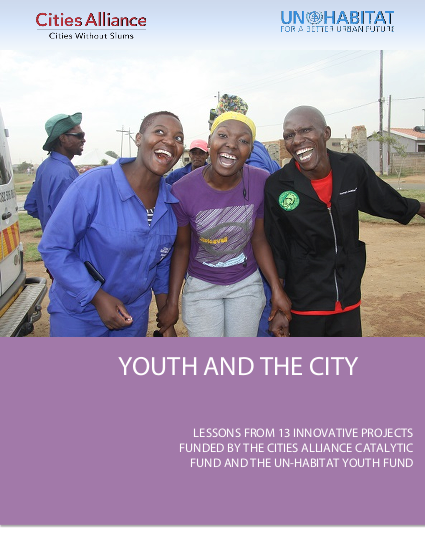
This report describes the process and results of a learning exchange event held in Johannesburg, South Africa in November 2015, hosted by UN-Habitat (United Nations Human Settlements Programme) and Cities Alliance. It brought together 12 youth-focused projects – six from each organisation – to share their experiences, extract lessons learned, and develop recommendations for engaging youth in development.
Key messages include:
- It is critical for local authorities to create spaces for dialogue and consultation with youth. This strengthens the relationship between community members and local authorities, and can result in the implementation better public policies.
- It is important to include youth and communities in policy making processes, through active involvement, consultative processes, or both.
- Participants felt that it was more important to integrate youth into existing policy platforms and support their participation there, rather than creating separate “youth” platforms through which youth can engage in policy.
- With the involvement of policymakers in youth projects, and with the involvement of youth in policy, participants felt it important to address the issue of transparency, which they viewed as a responsibility to share information, including information about what decisions are made and how city resources are allocated.
- The commitment and active involvement of city policy makers in youth programmes and projects is an important factor for the success of youth-led or youth-focused city development projects.
- Local authorities should create joint funding mechanisms for community-owned projects as a strategy for leveraging what stakeholders are each uniquely positioned to offer, while also building synergies to provide sustainable solutions to existing community needs.
- Local authorities need to take the informal sector into account as a positive resource for cities. It is a huge part of most countries’ economies, but in many cases, remains an under-utilised resource.
- National and local authorities must see youth not as problems, but as problem solvers. Young people are experts of their own territories, and local authorities should use (and value) their innovation and expertise in achieving sustainable city development.
Links
Resource collections
- Innovation
- UN Habitat - Urban Response Collection
- Urban Response - Urban Crisis Preparedness and Risk Reduction
- Urban Response Collection - Community Engagement and Social Cohesion
- Urban Response Collection - Economic Recovery
- Urban Response Collection - Environment and Climate Change
- Urban Response Collection - Housing, Land and Property
- Urban Response Collection - Urban Crisis Response, Recovery and Reconstruction
- Urban Response Collection - Urban Resilience